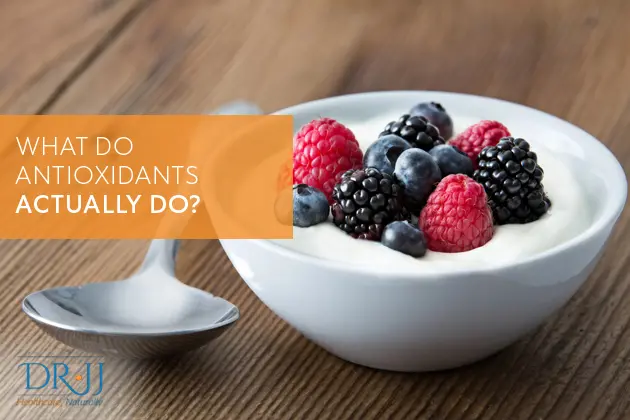
In the ever evolving landscape of health and wellness, few concepts have garnered as much attention as antioxidants.
These remarkable compounds have earned their reputation as defenders of your body.
They are most known for their potential to fight against cellular damage and promote longevity.
But let’s go beyond the hype and delve into the heart of the matter: what do antioxidants actually do?
Antioxidants do everything from battling free radicals to supporting overall well being.
Their contributions to your body are nothing short of awe inspiring.
My name is Dr. JJ and I am a naturopathic doctor in Toronto.
Together, let’s break down the science behind antioxidants.
First, What Are Free Radicals?
Free radicals are molecules with unpaired electrons.
Having unpaired electrons makes them highly reactive within the body.
They are formed through natural metabolic processes and external sources.
External sources can be things such as pollution, UV radiation, and certain lifestyle choices like smoking.
These external sources can cause a buildup of toxins in your body that contain free radicals.
The unpaired electron makes free radicals unstable.
Because they are unstable, free radicals will try to snatch electrons from nearby molecules in an attempt to achieve stability.
This triggers a cascade of chain reactions and damages important parts of your cells.
Why Are Free Radicals A Problem?
Sometimes, free radicals serve essential roles in various cellular processes.
However, when their numbers spiral out of control, they pose a significant problem.
This is due to their highly reactive nature and potential to cause cell damage.
When these unstable molecules run rampant in our bodies, they seek to stabilize themselves from other molecules.
This causes them to initiate damaging chain reactions.
Free radicals do play essential roles in cellular signaling and your immune system.
However, an excess of them can lead to oxidative stress.
This imbalance overwhelms your body’s natural defense mechanisms and results in widespread harm to your protein, lipids, and even DNA.
Oxidative stress has been linked to various issues across your body.
These include accelerated aging, inflammation, and a higher risk of chronic diseases.
So, while some free radicals are helpful, having too many of them can be a big problem.
How Do Antioxidants Help?
Antioxidants step in to neutralize the havoc caused by free radicals.
They have an extra electron to spare and offer it up to the free radicals.
This effectively puts an end to their electron stealing spree.
By doing so, antioxidants break the vicious cycle of cellular damage and prevent further harm to essential molecules.
This active intervention protects your cells from the effects of oxidative stress.
Essentially, antioxidants act as a defense.
They swoop in to restore order and maintain the balance required for your body to function optimally.
What Substances Are Antioxidants?
Antioxidants are found in many substances.
Each is armed with the ability to counteract the forces of free radicals.
Let’s take a look at them below.
1. Vitamin C
Vitamin C is hailed as a potent antioxidant.
It is a water soluble micronutrient that has a crucial role in various bodily functions.
Vitamin C is found in an array of foods like citrus fruits, bell peppers, and broccoli.
Vitamin C serves as a foundational element in your body’s growth and repair process.
Beyond its role in collagen production, vitamin C also acts as a potent antioxidant.
It defends cells from the damaging impact of free radicals.
Its active involvement in immune function and wound healing further underlines its significance.
Vitamin C’s many contributions to your body makes it an important compound for maintaining optimal health.
2. Vitamin E
Vitamin E is a group of fat soluble compounds.
It is a guardian of your cellular well being.
You can find vitamin E in nuts, seeds, and leafy greens.
Vitamin E has antioxidant capabilities that shield your cells from oxidative stress.
In addition to its protective role, vitamin E contributes to your immune function and helps in maintaining healthy skin and healthy eyes.
RELATED: The Basics On Vitamins
3. Manganese
Manganese is an essential trace mineral that plays an important part behind the scenes.
It’s found in foods like whole grains, nuts, and leafy vegetables and contributes to the metabolism of carbohydrates, proteins, and fats.
It also participates in bone formation and blood clotting.
Also, manganese serves as a co factor for various enzymes involved in antioxidant defense.
4. Iron
Iron is an essential mineral with unwavering significance.
It is abundant in foods like red meat, beans, and leafy greens.
Iron serves as a crucial component of hemoglobin, the protein responsible for transporting oxygen throughout the bloodstream.
In addition to oxygen transport, iron actively participates in energy production.
It helps your cells in generating the fuel they need to function efficiently.
Also, iron is involved in immune system function and cognitive development.
Iron deficiency is a common problem, so iron is an important mineral to keep an eye on.
5. Glutathione
Glutathione, a natural compound that exists within every cell of your body, has risen to prominence as a potent antioxidant.
Distinct from other antioxidants like vitamin C and E, glutathione is unique in that it lives within cells.
This positions it strategically to counteract the effects of free radicals at its source.
Glutathione is also abundant in various fruits and vegetables.
Importantly, it is present in white blood cells, which are crucial for your body’s immune response.
Not only does glutathione fight against free radicals, it also helps the liver in the detoxification processes and supports the immune system.
Additionally, it contributes to the creation of leukotriene, a compound that manages inflammation.
It also plays a role in apoptosis, the natural cell death process, which can delay cancer cell growth.
With its multifaceted roles and potential therapeutic benefits, glutathione is establishing itself as a fundamental player in maintaining your health.
Foods High In Antioxidants
Elevate your nutrition game by embracing a diet rich in foods teeming with antioxidants.
The USDA tested over 100 foods across categories to compile a roster of the top 20 antioxidant rich options.
These foods include:
- Dark leafy greens
- Small red beans
- Wild blueberries
- Red kidney beans
- Pinto beans
- Cultivated blueberries
- Cranberries
- Artichokes
- Blackberries
- Prunes
- Raspberries
- Strawberries
- Red delicious apples
- Granny smith apples
- Pecans
- Sweet cherries
- Black plums
- Russet potatoes
- Black beans
- Plums
- Gala apples
If none of these foods are appealing, don’t worry.
The American Dietetic Association created a comprehensive guide to foods highest in antioxidants arranged by food groups.
Fruits emerge as vibrant champions, brimming with antioxidant goodness.
The allure extends to dried fruits too, where the antioxidant concentration intensifies.
Dried pears, plums, and figs make for convenient and wholesome snacks, although it’s wise to steer clear of those laden with processed sugars.
Don’t forget the power of colourful vegetables like bell peppers, carrots, and tomatoes, which are not only pleasing to the palate but also brim with antioxidant benefits.
If you’re seeking a satisfying crunch, nuts and seeds like almonds, walnuts, and sunflower seeds are also excellent sources.
Spices and herbs, like cinnamon, oregano, and turmeric, not only elevate flavors but also boast high antioxidant content.
Beverages, often underestimated, carry a significant antioxidant load, from green tea’s surge in popularity to a more classic coffee.
By incorporating these nutrient dense choices into your daily diet, you’re not only tantalizing your taste buds, but also empowering your body with the armor it needs to fight oxidative stress.
Questions? Ask Dr. JJ!
In a world pulsating with health trends and wellness pursuits, the role of antioxidants emerges as an undeniable cornerstone.
Antioxidants serve as vigilant defenders against free radicals, safeguarding your cells from damage and promoting a thriving existence.
If you’re seeking personalized guidance and a comprehensive approach to your health journey, the expertise of a naturopathic doctor can be an invaluable asset.
As a naturopathic doctor with a passion for integrating natural remedies into health solutions, I’m here to help.
Book your appointment with me, Dr. JJ, today.
If you have questions about naturopathic medicine, or you’d like to take your first step into the world of naturopathy, contact me, Dr. JJ, and let’s book an appointment.
Yours in health,
Dr. JJ Dugoua, Naturopathic Doctor
600 Sherbourne St, Suite 315,
Toronto, ON M4X 1W4
-https://goo.gl/maps/6VDXwiCihRpDRo5A9
Dr. JJ Dugoua is a naturopathic doctor in Toronto and has a PhD in Pharmaceutical Sciences. His clinic provides solutions for many health concerns and has a special focus on thyroid health issues.


